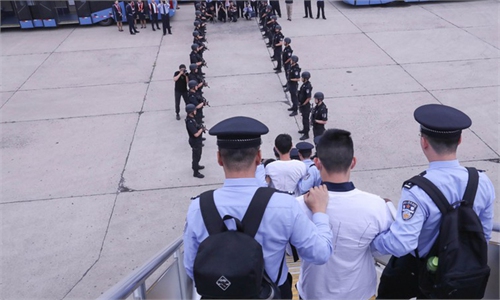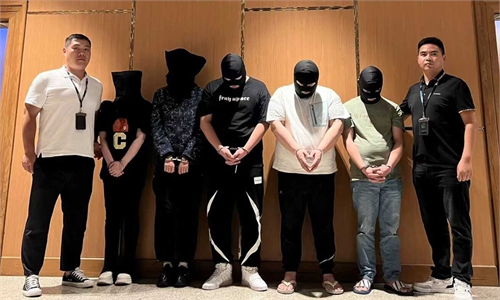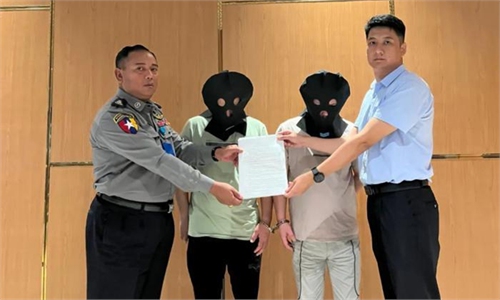IN-DEPTH / IN-DEPTH
Police, insiders uncover efforts to curb cross-border telecom fraud in Southeast Asia, as China's determination and crackdowns reach a new peak
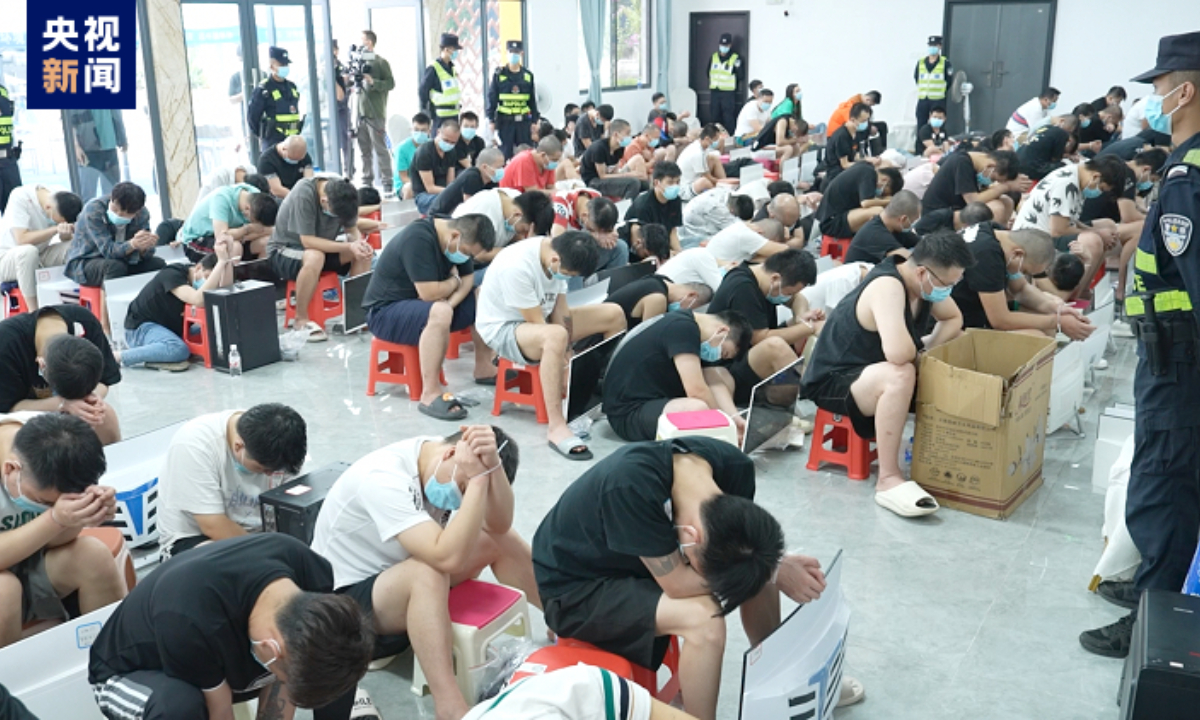
Photo:CCTV
As Chinese hit movie No More Bets that exposes digital scammers, fraud farms and gangmasters went viral, the topic of telecom scams in Southeast Asia, especially in northern Myanmar, has once again made a splash across Chinese social media. Terrifying stories in northern Myanmar involving kidnapping and human trafficking have once again brought the long-standing, difficult problem into the public spotlight and prompted heated discussion, which has deterred Chinese tourists from visiting the country, a previous hot travel destination.
This time, we witness an unprecedented effort by the Chinese government to combat telecommunications fraud. The government of Myanmar's Wa State, which has become known as a hub for telecom fraud, recently issued an internal document demanding a strict crackdown on the criminal activity, particularly those targeting Chinese citizens, according to a notice circulating online.
Although the Global Times could not verify the authenticity of the notice, the determination of the Chinese government is apparently driving effective cross-border cooperation on cracking down telecom fraud.
The public security force of border city Pu'er, Southwest China's Yunnan Province, has joined hand with their counterpart in Myanmar to launch a crackdown campaign along the border. A total of 1,207 suspected criminals involved in fraud from northern Myanmar were successfully handed over to Chinese police, including 41 fugitives wanted online.
This is the latest major achievement in the crackdown on fraud following the previous capture of 269 suspected criminals and dismantle of 11 telecom fraud dens from northern Myanmar on September 3, CCTV News reported.
Multilateral mechanism is also at work, as China, Myanmar, Thailand and Laos have vowed to protect people from gambling fraud and related crimes through joint special operation.
Who are these people engaged in fraudulent activities? What drives them to telecommunications fraud, and how were they caught up in it? What is the truth behind popular online claim of "extract their kidneys and sell their organs?" What are the challenges faced by border police working on the frontline with the mission of persuading individuals trapped in the clutches of telecom fraud to return? The Global Times reached frontline police officers, victims, and insiders to reveal how China has ramped up its efforts to crack down on telecom fraud, a plague that has spread in the era of digital payment and harmed numerous Chinese families.
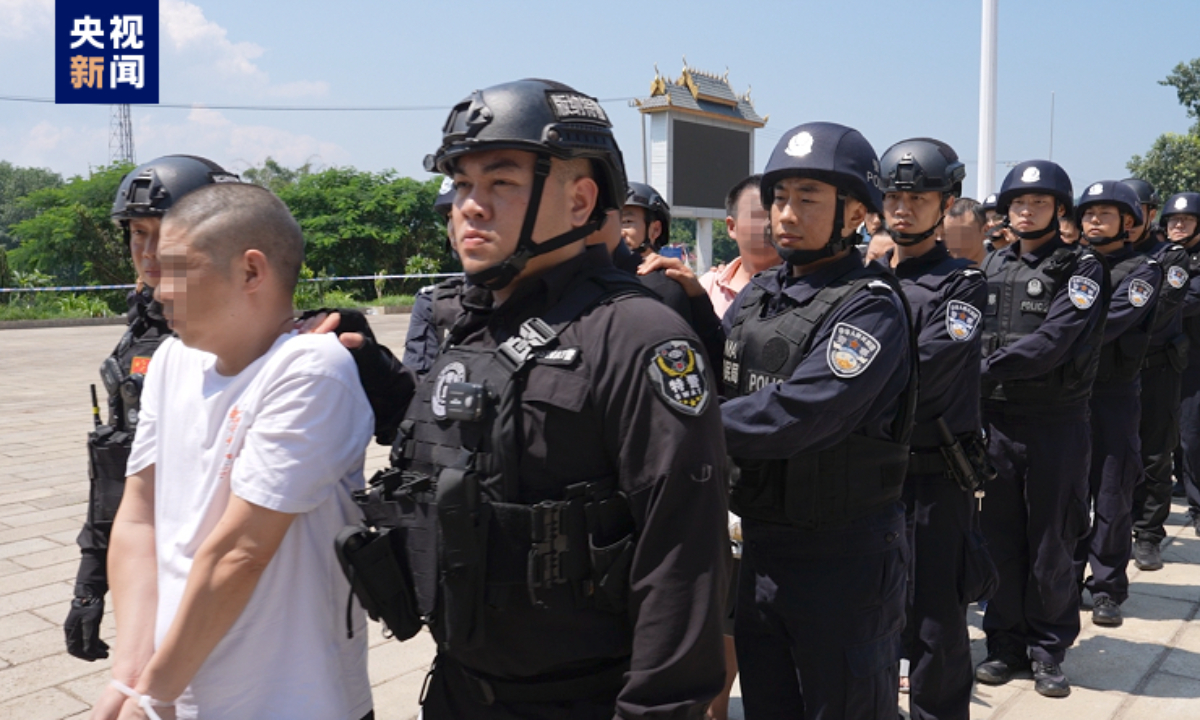
Photo:CCTV
Disappearing at the border
As rampant telecom fraud news and stories in Southeast Asia swept Chinese social media in recent weeks, various industries in China launched a massive anti-fraud campaign. From anti-fraud training as the first lesson for students at the beginning of the school year, to community police officers visiting homes to convince people installing anti-fraud apps on their mobile phone, and the widespread broadcasting of anti-fraud videos on public transportation, China's determination and efforts to combat telecom fraud have reached a new peak.
Frontline police officers involved in anti-fraud work highlighted the strengthened efforts.
A police officer surnamed Lin in East China's Fujian Province - a high-risk area for telecom fraud in China - told the Global Times that the local government has been investing more resources and manpower into large-scale anti-fraud campaigns since 2019.
As the three years of the COVID-19 epidemic led to an increase in the fraudulent calls, special task forces have been established since then, Lin said.
Due to intensified efforts, 80 percent of those who went from Fujian to Southeast Asia to engage in telecom fraud have been successfully persuaded to return, Lin said. However, there are still some individuals who cannot resist the temptation of making a quick buck and go back again.
Northern Myanmar, a breeding ground for violence in telecom fraud, is seen as a gold rush destination by some jobless Chinese youngsters, as fraud gangs in northern Myanmar do not set any educational threshold and offer "high salaries," catering to the desire for quick wealth.
According to data released by the China's State Council, as of March 2022, among 10,589 illegal immigrants, 70 percent of them were engaged in telecom fraud.
Lin participated in anti-fraud and persuasion campaigns in northern Myanmar in the spring of 2021. He found that only 3-5 percent of people there could actually make big money. The majority of them dreamed of "earning a big fortune," and many of them were lured by their fellow villagers or friends.
Who exactly makes up the majority of telephone fraudsters in northern Myanmar? Du Guanglei, deputy director of the public security bureau of Xiangyang, Central China's Hubei Province, conducted a survey on criminal activities along the China-Myanmar border in 2020.
The study showed that the majority of illegal immigrants were rural residents, with the majority being males, and 56 percent of them were between the ages of 20 and 30. They generally have lower education levels, with 69 percent having only completed junior high school.
The northern region of Myanmar is typically a vacuum zone in terms of systematic and efficient government management, which provides a breeding ground for crime. Some local warlords in northern Myanmar secretly supported the telecom fraud industry and collected "protection fees" from it. They used epidemic lockdowns as an excuse to obstruct those engaged in telecom fraud from returning to China over the past three years, according to Lin.
Yang, an 18-year-old who was once deeply involved in telecom fraud, shared his painful experience in Myanmar with the Global Times. With the help of a snakehead, he crossed the border from Yunnan to Myanmar in December 2020.
Upon arrival, he discovered that the "comfortable and luxurious office environment" promised in the ads was a few shabby scattered in houses in a grassy field. As soon as he met his contact, he was taken to a dim room and forced to hand over his phone, bank cards, and ID. Subsequently, Yang had his freedom restricted by armed personnel until he signed a labor contract.
Yang recalled that those who failed to meet their targets would be dragged into a room and brutally beaten, or handcuffed and electrocuted. He often heard screams. He was not spared from this ordeal either.
In February this year, after experiencing nearly two years of nightmare in Myanmar, Yang finally saved enough money to redeem himself and regain his freedom. As soon as he left, Yang went straight to the border checkpoint in the border city of Ruili and surrendered himself to Chinese police officers.
"The past three years of the pandemic have seen the greatest efforts and the highest number of successful persuasions for returnees. There have indeed been cases of people queuing up online to voluntarily surrender and return to the country," said Lin.
"Persuasion involves reasoning with them and appealing to their emotions. For those who have been listed as fugitives by the public security organs, I advise them to return and surrender themselves, as having mitigating circumstances can reduce their punishment. We also mobilized their family members to persuade them. Some people, upon seeing their parents coming to the border crying and urging them to come back during video calls, have chosen to turn back from the wrong path," said Lin.
Paying a ransom and fleeing have become the mainstream ways to escape the scam hub, according to the veteran policeman. He said that the majority of people who return are able to find jobs and resume their normal lives. For those who are unable to find jobs for a period of time after returning, the local government will provide training and support.
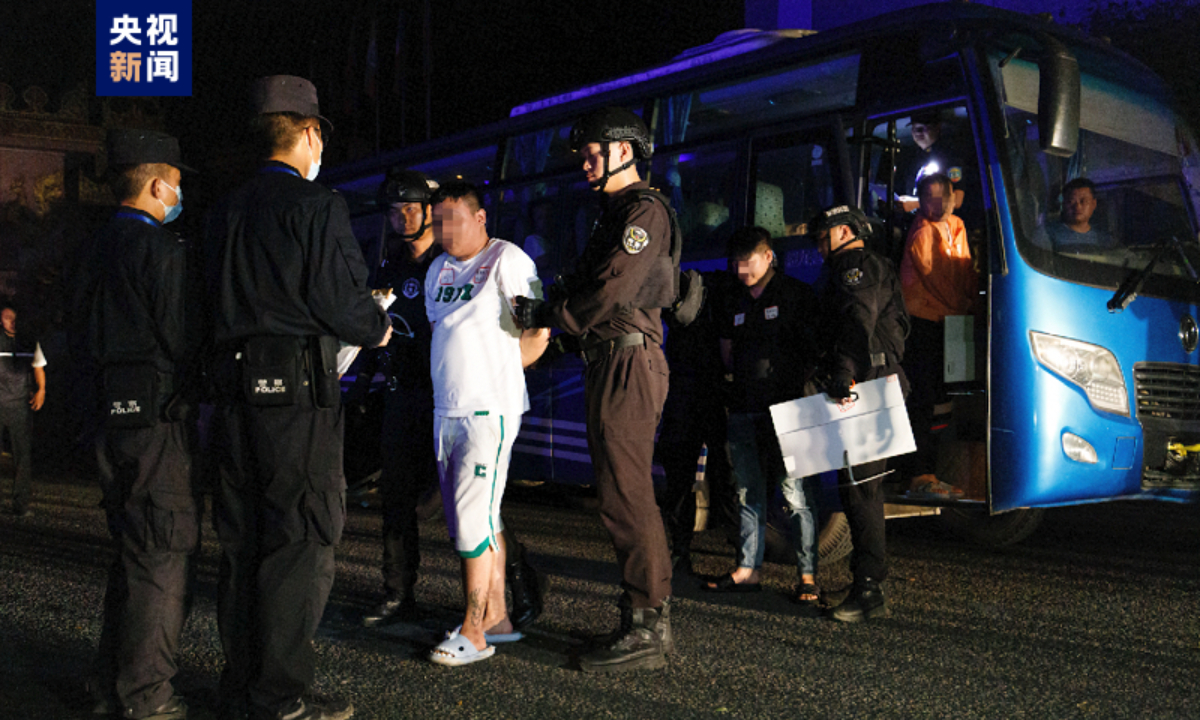
Photo:CCTV
Cross-border cooperation upgraded
Recently, the public security authorities have investigated and sorted out a batch of clues related to criminal activities involving Myanmar in the northern region. Over 1,100 of them were telecom fraud cases, involving a total amount of 120 million yuan ($16.37 million), media reports said.
An insider from the Yunnan border police department told the Global Times that due to the absence of an extradition treaty between China and Southeast Asian countries including Myanmar, Chinese police face difficulties in enforcing the law overseas to crack down on fraud gangs abroad. The cost of rescuing a person from criminal gangs is also high. However, the governments in the China-Myanmar border regions are currently holding meetings to negotiate the establishment of a long-term mechanism to combat telecom fraud crimes.
According to CCTV News, on August 15, the Chinese Ministry of Public Security, the Royal Thai Police, the Myanmar Police Force, and the Lao Ministry of Public Security jointly launched a special cooperative operation against gambling fraud and related crimes such as human trafficking, kidnapping, and illegal detention in Chiang Mai, Thailand.
The four parties decided to establish a comprehensive coordination center for the special operation in Chiang Mai, Thailand, and set up joint action points in areas where gambling fraud is rampant to crack down on crimes such as human trafficking, kidnapping, and detention.
The parties also expressed their determination to crack down on the criminal groups, and firm determination to protect people through concrete actions.
A journalist surnamed Zhao based in Bangkok, who has been reporting telecom fraud crime for years, told the Global Times that the crime is mainly concentrated in the Thailand-Myanmar border area, especially in areas with lax security and rampant corruption.
A small portion of the Chinese involved in telecom fraud may move on to organized crime groups involved in drug trafficking and even human trafficking. But the widely circulated online rumors about people being force to sell their organs are exaggerated, said Zhao.
Zhao emphasized that in recent years, with China's strengthened crackdown efforts, the Thai government has also attached more importance to the fight against telecom fraud.
Lin believes that as the border reopened after the pandemic, the space for cross-border cooperation in combating crime has expanded, and the breeding ground for criminals is shrinking.
"I hope that one day I will no longer receive calls from victims of telecom fraud crying for help or calls from the families of fraudsters seeking salvation for their children," Lin said.

